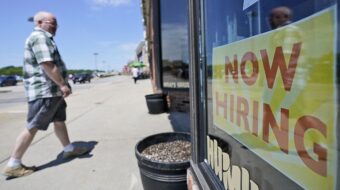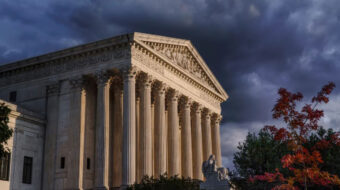
Evo Morales is Bolivia’s first indigenous head of state in 500 years. The day before his inauguration on Jan. 22, a huge assembly of Bolivia’s indigenous people, who represent two-thirds of the country’s population, ceremonially granted him power.
Morales is also the first Bolivian president to win an absolute majority of the vote, 54 percent.
In a pre-election interview, Morales’ running mate for vice president Álvaro García Linera — a sociologist, author and former political prisoner — outlined constraints operating on a Morales government. The presidency, he suggested, is but one instrument of power. Opposition forces control the Legislature, judiciary, military, bureaucracy and police. The “Evo project,” he predicted, will take 20 or 30 years. Only then might a Bolivian form of “collective socialism” evolve.
Morales has sought cabinet and military leaders who are free of foreign influences. He renounced 57 percent of his presidential pay, making possible a 7 percent hike in teachers’ salaries. His government has dealt with flooding and landslides affecting 60 percent of the country, secured debt cancellation from Japan and Spain amounting to $200 million, and obtained financial backing for highways to Chile and Brazil.
At the same time, beginning with the acceptance of a congratulatory telephone call from President Bush on inauguration day, Morales has avoided confrontations with Washington. On Feb. 13, leaders of the coca growers’ union demanded the departure of U.S. narcotics agents. In retaliation, U.S. officials refused to issue a visa to a prominent Morales ally, Sen. Leonida Zurita. Morales backed the U.S. position, with his vice president noting, “We are working hard [for] an appropriate relationship” with the U.S.
The Morales government is cooperating with U.S. efforts to block cocaine distribution, although it supports farmers’ rights to grow coca for ritual and medicinal purposes. It continues to accept U.S. oversight of the Bolivian Air Force unit associated with the nation’s police.
Morales has taken pains to express support for private property in conversations with landowners and natural gas operatives embroiled in separatist agitation in the states of Santa Cruz and Tarija. He reminded them of investment opportunities in nearby iron and magnesium mining operations, and has agreed to a national vote on autonomy in the two regions.
The specter of a military takeover is omnipresent, given Bolivia’s history of 180 coups since 1825. The military is reportedly divided. Part of it identifies with the popular movement, while another part opposes it. Some worry about separatists teaming up with U.S. troops nearby in Paraguay. They reportedly resent U.S. plans to pare down its $150 million annual aid for Bolivian military projects, after the Bolivian government joined 12 other Latin American nations in refusing to exempt U.S. personnel from prosecution by the International Criminal Court.
Responding to its populist base, the new government has announced plans for a July 2 vote for delegates to a Constituent Assembly set to convene Aug. 6. Control and distribution of oil and natural gas resources will be on the agenda, as well as democratization of elections and women’s role in politics. Observers speculate that the Morales forces are holding off on major change until the Constituent Assembly is under way. The government is working toward full indigenous representation at the assembly.
Morales also faces challenges from the left. Morales’ own political party lagged behind other groups in setting the stage for his victory. Before the elections, the leader of the Confederation of Bolivian Workers called for a “Bolivian Hugo Chávez” to lead the struggle. The union has generally withheld support for the new government. In February, Morales responded to left critics: “If I am not advancing enough, then push me.”
Hugo Blanco, the charismatic Peruvian peasant leader of 40 years ago, attended Morales’ inauguration. He recently highlighted special characteristics of Bolivia’s struggles. Much more is involved there than overturning a government, he suggested. It involves “refounding” a nation. Indigenous peoples missed out on the nation’s first founding, and now their turn is approaching, and that of the entire population.











Comments